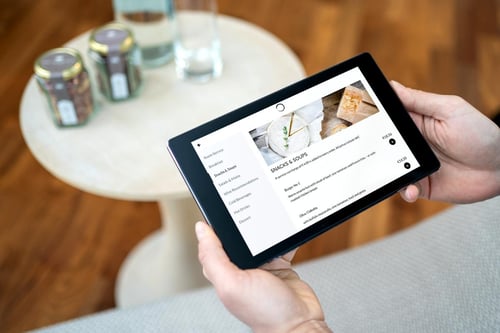![]() AI's popularity has surged thanks to platforms like ChatGPT, making it accessible for everyday use. How can the hospitality industry hop on this trend and utilize AI to enhance guest experiences and stay ahead of upcoming changes?
AI's popularity has surged thanks to platforms like ChatGPT, making it accessible for everyday use. How can the hospitality industry hop on this trend and utilize AI to enhance guest experiences and stay ahead of upcoming changes?
 In their heyday, the hospitality industry was all about innovation. For the guests, the hotel experience represented the comfort and innovation that needed to be improved in their environments. So, every small convenience like ordering room service, conveniently helping yourself to a drink from the in-room mini fridge, or watching a just-released Hollywood movie on a TV at the foot of your bed was enough for most people, and they were willing to pay for it. The inherent trade-off was that the guest was paying the hotel for comfort, convenience, and exciting innovations, and the hotels were keen to provide them.
In their heyday, the hospitality industry was all about innovation. For the guests, the hotel experience represented the comfort and innovation that needed to be improved in their environments. So, every small convenience like ordering room service, conveniently helping yourself to a drink from the in-room mini fridge, or watching a just-released Hollywood movie on a TV at the foot of your bed was enough for most people, and they were willing to pay for it. The inherent trade-off was that the guest was paying the hotel for comfort, convenience, and exciting innovations, and the hotels were keen to provide them.
However, time has changed. Guests now can access almost every technological convenience, and as it is with the nature of humankind, they adapt very quickly to those standards. So, in turn, the competitive edge of the hotels has become thinner, and the tastes of the guests have become more and more refined. Therefore, as the heart of the hospitality industry, the guest experience needs to be redefined with every change.
Keeping Up with the changes
Perhaps one of the most significant changes the hotel industry faces is the digital revolution. Luckily, the industry presents countless opportunities for digital solutions to improve the guest experience while providing hotel owners advantages like enhanced efficiency, reduced expenses, and higher levels of guest contentment.
In the last year, thanks to the platforms like ChatGPT, the popularity of AI has skyrocketed. As a result, this piece of technology which was previously thought to be too advanced for public or regular use has started to slowly but surely creep into our everyday lives. Luckily, the hospitality industry offers plenty of opportunities for AI to be integrated into the guest experience.
Here are four ways the hotel industry can make the most out of AI technology and stay ahead of the change it will inevitably bring.
 1-Chatbots and Virtual Assistants
1-Chatbots and Virtual Assistants
The traditional way of delivering guest service with trained staff and outdated technology has been slowly losing its appeal. Time is of the essence in the fast-past reality of today's world, and any solution that will reduce the time and effort, both for the guest and the hotel staff, will be welcomed with open arms by the industry.
One of the solutions to improve processing times and the overall quality of guest service can be AI-powered chatbots and virtual assistants. These intelligent bots can handle guest inquiries and provide personalized recommendations based on guest preferences, such as recommending local attractions or restaurants. They can also automate booking and reservation processes, allowing guests to quickly and easily make reservations. With the sheer scale of time and quality optimization, one can have no doubts that this technology can and will be the standard of the future.
2-Personalized Marketing
Data analysis is a cumbersome endeavor for any hotel. It is time-consuming and requires a particular knowledge and skillset. To make things a lot easier for hotel marketers, AI can be used to analyze guest data, such as booking history and preferences, to provide personalized marketing messages and offers to guests.
For example, a hotel can use AI to analyze guest data and create personalized email campaigns that promote spa services to guests who have previously booked spa services. The hotel can also use AI-powered chatbots to provide customized recommendations for nearby attractions or restaurants based on the guest's location and interests.
3-Room Service Automation
AI-powered robots can be used to automate room service, delivering food and other items to guest rooms. These robots can navigate hallways and elevators autonomously, and guests can use their smartphones or digital guest directories like in-room tablets to request room service with only one click. These AI-powered devices can also be able to anticipate your guest's needs and make personalized recommendations based on their previous orders and preferences.
By using AI for room service automation, hotels can create a seamless and enjoyable experience and free up their staff to focus on other tasks, improving operational efficiency and reducing costs.
4-Multilingual Guest Experience
AI can also improve the communication of hotels with their international guests. Using AI-powered chatbot translators can open new ways for hotels to interact with their clientele. These chatbots are equipped with natural language processing for text and voice generation, allowing them to converse with your guests in their native language. This ensures that communication between the machine and the user is always precise, clear, and seamless.
Conclusion
These four ways to integrate AI into the hotel experience are just the tip of the iceberg. AI is notorious for its self-learning abilities, and the ever-evolving nature of the technology itself opens ways for it to be interpreted in a wide range of environments. The impending change AI will bring into our everyday lives is far from being a science-fiction scenario but a possibility in the very near future.
Of course, like every technological advancement, those who catch the first wave of change will be the ones who benefit from it the most.
📸 Copyright: SuitePad
Published on 2 May 2023
.jpg)


.png?width=100&height=100&name=Bastien%204x4%20(11).png)
.png)

.png)
